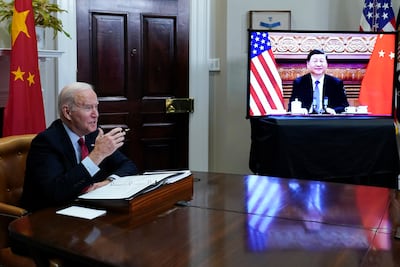In the past, I have in these pages called for a reboot of the Non-Aligned Movement (NAM), the Cold War-era organisation formally established in 1961 through the efforts of five giants of the developing world: India's Jawaharlal Nehru, Ghana's Kwame Nkrumah, Indonesia's Sukarno, Egypt's Gamal Abdel Nasser and Yugoslavia's Josip Broz Tito. Opposed to colonialism, imperialism and foreign aggression against its member states, NAM promoted the security and sovereignty of its mostly Global South members who wished not to be coerced either into the Soviet bloc nor into accepting American hegemony.
Similarly today, there are frequent demands by the major power – the US – and countries that still think they're major powers, such as the UK, for many of the same countries to share their stance on major issues. A NAM 2.0 was needed, I thought, to unite the numerous states that do not wish to do so.
But it is becoming clear that there is no need to officially have a NAM 2.0 – it effectively already exists. Recent statements by Indonesian President Joko Widodo, popularly known as Jokowi, constitute a stark and concrete example. Indonesia will host the G20 meeting in November on the island of Bali, and Mr Widodo has been under pressure from the White House for months to exclude Russian President Vladimir Putin because of the invasion of Ukraine.
But in a recent interview, Mr Jokowi showed he wouldn’t be pushed around. Would Chinese President Xi Jinping be attending, he was asked. “Xi Jinping will come,” he said. What about Mr Putin? “President Putin has also told me he will come,” Mr Jokowi replied.
It was quite appropriate for an Indonesian president to state bluntly that he will not take sides, whether for or against the US, Russia, China or anyone else, given that NAM’s genesis was in the 1955 Bandung Conference hosted by then president Sukarno. But he is far from alone. Singaporean Foreign Minister Vivian Balakrishnan said exactly that in an interview last week: “We do not take sides,” he said. “We are not pro-anyone or anti-anyone, we are only pro-Singapore.”


The city-state has imposed sanctions on Russia. “We had to take a stand,” he explained, as “when a big power threatens to or actually tries to redraw boundaries on the basis of historical errors and crazy decisions, all alarm bells go off and especially in Singapore.” Nevertheless, he reiterated, “we will resolutely refuse to choose sides".
Without formally declaring "non alignment", that is possibly the position of most countries in the world, from Arab states to Asia, Africa and South America. This burgeoning trend has been picked up by others, notably by Robin Niblett, the outgoing director of the Royal Institute of International Affairs, or Chatham House, in London, in the farewell lecture he gave in July. Framing “America’s Atlantic and Pacific partners” as being one side, and Russia, China and a few other countries such as Iran and Venezuela as the other, he said: “The fact is that the largest group of countries in the world today lie outside these two divided groups. They are the neo-non-aligned.”
“America’s and Europe’s global credibility and soft power have been damaged by their past hypocrisy and double standards,” Mr Niblett continued. “The neo-non-aligned can now triangulate between the world’s democratic and authoritarian poles … [and] can leverage their strategic value to the two sides in order to gain investment and protection from both.”
Indeed, this new de facto NAM could be a lot more effective than the old one, for a number of reasons, including the fact that much of the developing world has made leaps and bounds since the Cold War, and is both less inclined to be bullied by major powers and less bulliable. This greater resilience is due to their economic gains and the strategic alliances they have made, such as the creation in 1967 of the Association of South-East Asian Nations and the crucial position this bloc of nearly 700 million people has attained in the political, security and economic architecture of the Asia-Pacific region.

David Howell, a former UK cabinet minister who is now Chair of the House of Lords International Affairs Committee, recently made a similar point in an astute essay on The Article website. “The ranks of the non-aligned carry infinitely more weight and influence than their 20th-century predecessors, thanks to the digital age with its powerful and ubiquitous decentralising impact in a now multi-polar world,” he wrote. Mr Howell also pointed to the considerable maritime legal authority even the smallest islands now have since the passing of the UN Convention on the Law of the Sea in 1992, and their capabilities in the sky above them, extending even into space, “the next main contested area, so we are told, of power and influence, both hard and soft".
As it happens, the original Non-Aligned Movement still exists – it celebrated its 60th anniversary last October, although you would be forgiven for having missed the celebrations. It still has its uses, not least as a convening bloc at the UN General Assembly, but it is widely considered to be moribund and, in any case, many of its 120 member states are very much aligned with major powers.
No. It is the serried ranks of the “neo-non-aligned”, to use Mr Niblett’s term, that we should look to. They “are growing and pushing ahead", Mr Howell concluded in his essay. “Perhaps it is they, rather than a divided West, or an over-reaching China, who are now setting the pace.” If that comes to be a reality in the years to come, the non-aligned will have achieved power and influence that the NAM’s founding fathers could never have dreamed possible – and with their commitment to conflict-avoidance, the world may be a safer place because of it.


